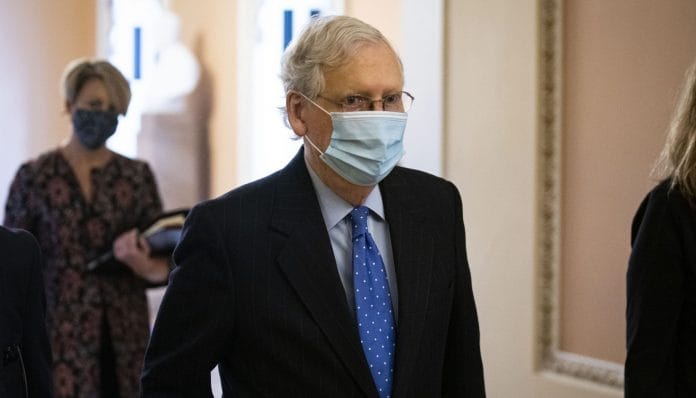Washington: Senate Majority Leader Mitch McConnell won re-election to a seventh term and now waits for the outcome of about a dozen other contests that will determine whether he retains his title when the new Congress convenes in January.
McConnell’s win over former Marine pilot Amy McGrath isn’t particularly surprising but came after Democrats across the country flooded her campaign with cash in hopes of defeating him, despite Kentucky being one of Trump’s best states.
The final outcome of the battle for the Senate might not be known for days while votes are tallied — or even months if control of the chamber hinges on whether one or both contests for Georgia’s two Senate seats are sent into a runoff.
President Donald Trump’s sagging performance at the top of the GOP ticket, the shift of suburban voters — particularly women — toward Democrats and the impact of a still-raging coronavirus pandemic has produced a roller coaster political year that greatly expanded the number of endangered Senate Republicans.
That’s also spurred record-shattering fundraising and spending on congressional races. The non-partisan Center for Responsive Politics projects total spending will hit $7.2 billion by the time it’s all counted, well above the previous high for congressional campaign spending of $4.1 billion for the 2016 election.
Playing defense
Republicans now hold a 53-47 Senate majority, but they are defending 23 of the 35 seats on Tuesday’s ballots. Based on polls and independent analysts, Democrats are favored to regain the majority, though the size of their advantage depends heavily on the presidential contest between Trump and Democrat Joe Biden.
Many of the presidential battlegrounds also are pivotal in the contest for Senate control, including North Carolina, Georgia, Iowa, Colorado and Arizona.
“There’s a decent chance we won’t know who controls the Senate on the evening of November 3,” Nathan Gonzales, editor and publisher of Inside Elections, said. “If control of the Senate comes down to a seat or two, then we’ll need to wait until one if not two runoffs in Georgia.”
Democrats retook control of the House with a 41-seat gain in 2018. They now hold a 232 to 197 advantage over Republicans, with one independent and five vacancies. Most independent political analysts forecast Democrats will add more seats to their column, even if several vulnerable members lose on Tuesday.
Also read: How counting of votes takes place in US states & why we shouldn’t expect a final result soon
House forecast
“We now view a Democratic net gain of 10 to 15 seats as the likeliest outcome, with anything from five to 20 seats well within the realm of possibility,” David Wasserman, House editor at the non-partisan Cook Political Report, wrote in his final pre-election analysis.
Several incumbents were re-elected in the first round of states to report results, with many of those races not much in doubt.
Democratic Senator Mark Warner was easily re-elected to a third term in Virginia and Republican Shelley Moore Capito won a second term in West Virginia, according to Associated Press projections. Incumbent Democrats Edward Markey in Massachusetts, Jeanne Shaheen in New Hampshire, Jack Reed in Rhode Island, Chris Coons in Delaware and Dick Durbin in Illinois also won re-election.
Along With McConnell and Capito, Republican James Inhoff won re-election in Oklahoma. In Tennessee, Republican Bill Hagerty won the seat being vacated by Republican Senator Lamar Alexander, who is retiring
One of the closely watched races is in South Carolina, where the Republican incumbent is Lindsey Graham, the chairman of the Senate Judiciary Committee. He turned from harsh Trump critic in 2016 to key presidential ally, which has drawn a backlash from voters in both parties. He faces a strong challenge from Democrat Jaime Harrison. Harrison broke fundraising records, bringing in $57 million in the third quarter alone, but the state has been a Republican stronghold that will be hard for Democrats to break.
The biggest targets for Democrats are GOP Senators Susan Collins of Maine, Cory Gardner of Colorado and Martha McSally in Arizona, all of whom have trailed their challengers consistently in public polls and fundraising. Collins and Gardner are the only two Republican incumbents in states won by Hillary Clinton in 2016. McSally lost in 2018 to Kyrsten Sinema before she was appointed to the seat once held by John McCain.
North Carolina’s Thom Tillis is another vulnerable GOP incumbent who has been outspent by his Democratic challenger, Cal Cunningham. The North Carolina Senate race is already the most expensive congressional race of all time, with $265 million spent by the candidates and other groups, according Center for Responsive Politics numbers.
Double contest
The Iowa race between GOP Senator Joni Ernst and Democrat Theresa Greenfield is the second most-expensive ever, with $218 million in total spending.
Georgia’s two Senate are close enough that one or both could go to a runoff, potentially leaving control of the chamber in doubt until January. In one race, most pre-election polls show Republican incumbent David Perdue in a tie with Democratic challenger Jon Ossoff, who narrowly lost an Atlanta-area House special election in 2017. That race includes Libertarian Shane Hazel.
In the other contest, Senator Kelly Loeffler, who was appointed by the governor, is one of 20 candidates in the special election for the seat, including GOP Representative Doug Collins who claims to be the true conservative standard-bearer. The leading Democrat in the race is Raphael Warnock, senior pastor of the Ebenezer Baptist Church in Atlanta.-Bloomberg
Also read: Joe Biden takes early lead over Donald Trump with Florida neck-and-neck






